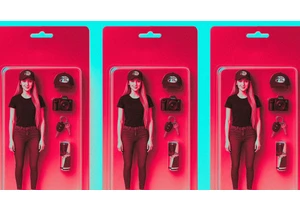The creator economy’s growth has spawned a patchwork of services aimed at becoming key assets in a creator’s tool kit. Various website builders, merchandise stores, membership platforms, and so forth are stitched together to create a comprehensive strategy for generating social commerce, which, according to market-research company eMarketer, is expected to rise nearly 36% this year to hit $36.6 billion. Clearly, there’s no shortage of creators who have made cobbling services together work. But Fourthwall is gunning to be the leading all-in-one option. Founded in 2019, Fourthwall is a platform that allows creators to launch their own site, shop online, accept donations, and offer membership services to their fans, all with full ownership of their brands and data. “We just make the business side of being a creator easy, so they can focus on the content and community engagement piece,” says Will Baumann, Fourthwall’s cofounder and CEO. “Whoever ends up helping the most in this space will be all-in-one—that’s just what is fundamentally easiest for creators rather than having to figure out all these different tools and stitch them together. We genuinely believe that’s where the market will end up.” [Image: courtesy of Fourthwall]And, apparently, investors agree. Fourthwall recently announced raising $17 million in funding from Seven Seven Six, Lightspeed Venture Partners, and Initialized Capital. “The creator economy finally went mainstream, but the software to professionalize it is still being built,” said Alexis Ohanian, founder of Seven Seven Six, in a statement. “Fourthwall solves the complex logistics of building a brand for the biggest creators.” Popular creators including comedian Brandon Farris, dancing couple Ellen & Brian, and musician Harry Mack were early adopters of Fourthwall, and, in Baumann’s estimation, are examples of the platform’s demo. “Every one of them has a community, and they’re connected with that group. So I would say that’s really who Fourthwall is for,” Baumann says. “Over time, we’ll certainly expand and make it more for more people. But for today we’re not for your cousin who wants to see if he can sell five t-shirts. We’re for folks who already have built those communities and share content with them.” [Image: courtesy of Fourthwall]Longtime YouTuber Phil DeFranco was another early adopter who says that he saw his merchandise revenue increase tenfold after joining Fourthwall. That relationship with the company eventually led to Baumann naming DeFranco the company’s chief creator officer. “We wanted to give him this title because he’s given such great feedback,” Baumann says. “And over time, what his role is really meant to be is making sure we are true to that voice for the creator. He’s giving real-time feedback. He’s been in the space for 15 years—he’s a true OG of the YouTube scene. And he knows what it takes to succeed as a creator.” [Image: courtesy of Fourthwall]Baumann also notes that Fourthwall’s features are tailored for creators to interact with their communities at different touch points, which other commerce platforms may not have considered. For example, fans who buy merch from a creator’s Fourthwall-powered platform can leave messages during checkout that the creator can respond to with a personalized video or audio note. “That’s something that for a traditional brand doesn’t really make much sense. It’s hard to envision a Nike or Supreme using that sort of thing,” Baumann says. “But for a creator, it makes a ton of sense ’cause this is their community.” Although NFTs and creator coins or social tokens have emerged as potential new revenue streams for creators that also bind their communities to them, Baumann remains focused for now on Fourthwall’s membership services. “We allow creators to sell digital products, so PDFs or e-books or anything in that realm. As for NFTs, we’re trying to keep our focus right now on the shops and membership side of things,” he says. “Heading into 2022, that’s definitely something on our road map and that we plan to support.” Building Fourthwall as an all-in-one platform instead of a singular feature was a time commitment that Baumann felt was necessary even in a rapidly changing industry like the creator economy. “The biggest challenge is time,” he says. “A lot can change in two years since you start building. We’re thankful creators are more popular than ever than when we started, but that of course is the big risk in terms of all these investments. We wanted to take that time upfront and really kind of set the foundations in place and build it right.”
Login to add comment
Other posts in this group


One of the more unique takes on the POV trend on TikTok: “POV: You bought a 100-year-old skyscraper . . . ”
For those unlikely to ever own a skyscraper themselves, TikTok’s Skyscraper Gu

When it comes to sharing Instagram Reels with friends, the process of three taps to get a Reel from A to B can feel surprisingly tedious. Now, Instagram has addressed that issue with its latest fe

New Jersey filed a lawsuit against Discord on Thursday, alleging that the social platform recklessly exposed children to “harassment, abuse, and sexual exploitation by predators who lurk on

Google has acted illegally to maintain a dominant position in online advertising, a federal judge ruled on Thursday. The tech giant’s “exclusionary conduct substantially harmed Google’s publisher

Welcome to AI Decoded, Fast Company’s weekly newsletter that breaks down the most important news in the world of AI. You can sign up to receive this newsletter ever

